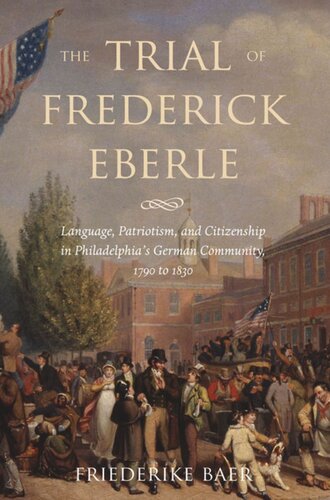

Most ebook files are in PDF format, so you can easily read them using various software such as Foxit Reader or directly on the Google Chrome browser.
Some ebook files are released by publishers in other formats such as .awz, .mobi, .epub, .fb2, etc. You may need to install specific software to read these formats on mobile/PC, such as Calibre.
Please read the tutorial at this link: https://ebookbell.com/faq
We offer FREE conversion to the popular formats you request; however, this may take some time. Therefore, right after payment, please email us, and we will try to provide the service as quickly as possible.
For some exceptional file formats or broken links (if any), please refrain from opening any disputes. Instead, email us first, and we will try to assist within a maximum of 6 hours.
EbookBell Team

4.8
14 reviews“This is microhistory at its best. Friederike Baer has selected a single event and brilliantly used it to explore the larger culture and society of the time. With great clarity and insight Baer has investigated multicultural issues of language and the assimilation of immigrants that are as relevant for us today as they were to Americans two centuries ago. This is a very important and timely book.”Gordon S. Wood, Brown UniversityIn the summer of 1816, the state of Pennsylvania tried 59 German-Americans on charges of conspiracy and rioting. The accused had, according to the indictment, conspired to prevent with physical force the introduction of the English language into the largest German church in North America, Philadelphia’s Lutheran congregation of St. Michael’s and Zion. The trial marked the climax of an increasingly violent conflict over language choice in Philadelphia’s German community, with members bitterly divided into those who favored the exclusive use of German in their church, and those who preferred occasional services in English. At trial, witnesses, lawyers, defendants, and the judge explicitly linked language to class, citizenship, patriotism, religion, and violence. Mining many previously unexamined sources, including German-language writings, witness testimonies, and the opinions of prominent legal professionals, Friederike Baer uses legal conflict as a prism through which to explore the significance of language in the early American republic. The Trial of Frederick Eberle reminds us that debates over language have always been about far more than just language. Baer demonstrates that the 1816 trial was not a battle between Americans and immigrants, or German-speakers and English-speakers. Instead, the individuals involved in the case seized and exploited English and German as powerful symbols of competing cultural, economic, and social interests.
In the summer of 1816, the state of Pennsylvania tried fifty-nine German-Americans on charges of conspiracy and rioting. The accused had, according to the indictment, conspired to prevent with physical force the introduction of the English language into the largest German church in North America, Philadelphia’s Lutheran congregation of St. Michael’s and Zion. The trial marked the climax of an increasingly violent conflict over language choice in Philadelphia’s German community, with members bitterly divided into those who favored the exclusive use of German in their church, and those who preferred occasional services in English. At trial, witnesses, lawyers, defendants, and the judge explicitly linked language to class, citizenship, patriotism, religion, and violence.
Mining many previously unexamined sources, including German-language writings, witness testimonies, and the opinions of prominent legal professionals, Friederike Baer uses legal conflict as a prism through which to explore the significance of language in the early American republic. The Trial of Frederick Eberle reminds us that debates over language have always been about far more than just language. Baer demonstrates that the 1816 trial was not a battle between Americans and immigrants, or German-speakers and English-speakers. Instead, the individuals involved in the case seized and exploited English and German as powerful symbols of competing cultural, economic, and social interests.